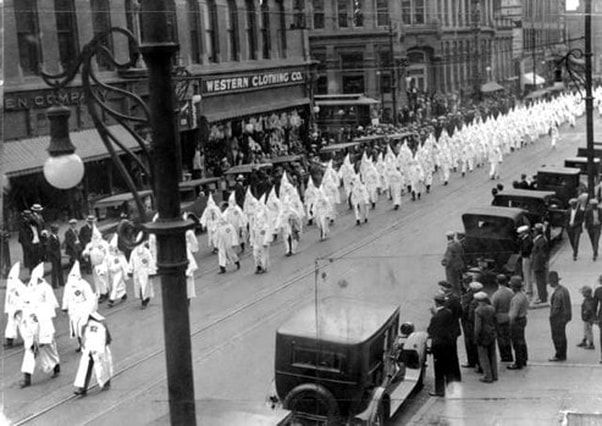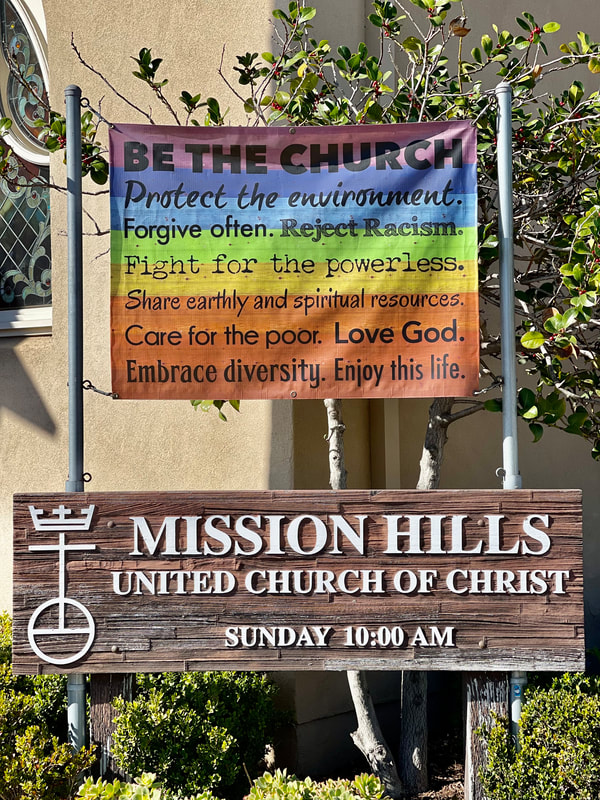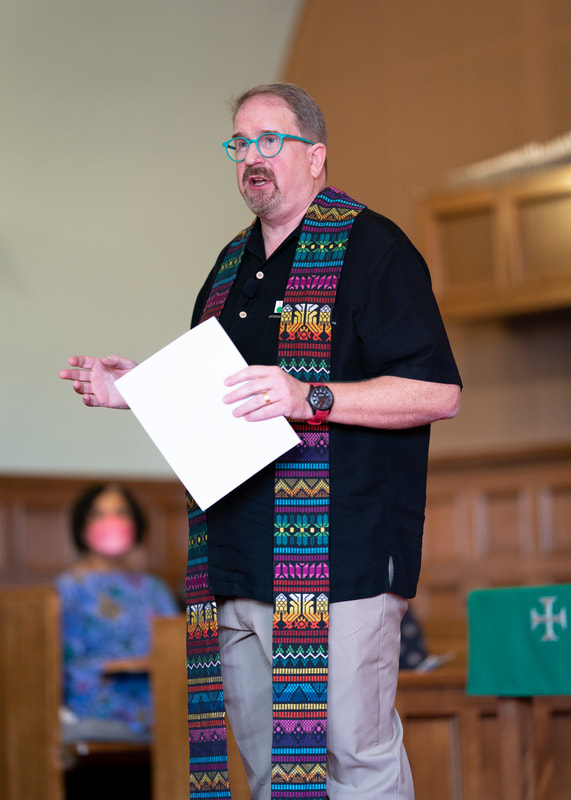 Sermons from Park Hill Congregational UCC Denver, Colorado Rev. Dr. David Bahr [email protected] August 25, 2019 “Waiting to ReName Stapleton for All” Luke 13: 10-17 – New Revised Standard Version “Now he was teaching in one of the synagogues on the sabbath. 11 And just then there appeared a woman with a spirit that had crippled her for eighteen years. She was bent over and was quite unable to stand up straight. 12 When Jesus saw her, he called her over and said, “Woman, you are set free from your ailment.” 13 When he laid his hands on her, immediately she stood up straight and began praising God. 14 But the leader of the synagogue, indignant because Jesus had cured on the sabbath, kept saying to the crowd, “There are six days on which work ought to be done; come on those days and be cured, and not on the sabbath day.” 15 But the Lord answered him and said, “You hypocrites! Does not each of you on the sabbath untie his ox or his donkey from the manger, and lead it away to give it water? 16 And ought not this woman, a daughter of Abraham whom Satan bound for eighteen long years, be set free from this bondage on the sabbath day?” 17 When he said this, all his opponents were put to shame; and the entire crowd was rejoicing at all the wonderful things that he was doing.” The authorities asked Jesus, “What’s your hurry?” Pointing to the formerly bent-over woman, they asked, “Why couldn’t she wait? It’s against the law to heal today. Do it tomorrow. It’s just one more day.” As though they really cared. After all, hadn’t she been standing there, standing bent-over, for 18 years? According to their logic, that’s 5,634 days on which she could have been healed. But no one cared about this woman with no name, no one saw her, until Jesus healed her on the wrong day. Now, they would no doubt scoff to hear that they were uncaring. “How dare you accuse us?” And claim to be the real victim, not her. “We care deeply about her suffering. But if she wants healing, she needs to wait, and do it legally.” This story made me think of the 1963 Birmingham Campaign that sought to bring national attention to the efforts of local black leaders to desegregate public facilities. On April 3rd, a series of actions began – lunch counter sit-ins, sit-ins at the library, kneel-ins at churches, marches on city hall and the county courthouse, and a boycott of downtown merchants. Eight clergymen in Birmingham issued an “Appeal for Law and Order and Common Sense,” published in the local paper,[1] which read in part, “We recognize the natural impatience of people who feel that their hopes are slow in being realized.” But demonstrations to realize those hopes, to gain their rights, they said, are “unwise and untimely.” Adding, “when rights are consistently denied, a cause should be pressed in the courts and in negotiations among local leaders, and not in the streets.” On April 10th, the city obtained a state court injunction against the protests and two days later, on Good Friday, Rev. Martin Luther King, Jr., was arrested for violating the anti-protest injunction and placed into solitary confinement for 10 days. While he was sitting in jail, Rev. King used the margins of the daily newspaper to scribble a letter to that group of fellow clergymen. In what I consider one of his most brilliant writings, known as Letter from Birmingham Jail,[2] he asked why the clergymen deplored the demonstrations but not for the conditions that made them necessary. The clergymen blamed outside agitators for riling up the local population, unconcerned they would need assistance with their cause. The clergymen said they were unhappy with the demonstrators’ willingness to break laws against mass gatherings but, why then, did they refuse to obey the Supreme Court decision to outlaw segregation in public schools. Why one law and not another, Rev. King asked. He expressed frustration that the Ku Klux Klan wasn’t their greatest stumbling block but the white moderate who is “more devoted to order than to justice, who paternalistically feels that he can set the timetable for another [person’s] freedom; who constantly advises to wait until a ‘more convenient season.’” It was a similar sentiment in a letter written to King by a man in Texas which read, “All Christians know that the colored people will receive equal rights eventually, but is it possible that you are in too great of a religious hurry?” You have no doubt heard pieces and parts of the Letter from Birmingham Jail before. I was struck by the similarities with the gospel text. Jesus was told to wait until it was technically legal to heal, citing laws about sabbath observance. He asked, why is ok for you to untie a donkey so it could drink water on the Sabbath but it is not OK to untie this woman so she can be free from her bondage? Remember the words “freedom from bondage.” It is key to understand this interaction. We may be most familiar with concept of keeping the sabbath holy from the Ten Commandments in the Book of Exodus.[3] Honor the sabbath because God rested on the 7th day. But Jesus was referencing a second list of Ten Commandments in the Book of Deuteronomy.[4] The same commandments, but in this case, why one was to keep the sabbath holy was different. It is tied not to the creation story but to freedom from bondage. “Remember that you were a slave in the land of Egypt, and the Lord your God brought you out from there with a mighty hand and an outstretched arm; therefore the Lord your God commanded you to keep the sabbath.” Jesus wasn’t disregarding the importance of the Law. He reminded them of its entire interpretation. He wasn’t saying the Law is uncaring but that their interpretation was too limited. Jesus noted that the observance of the sabbath was to commemorate the freedom of slaves from their bondage in Egypt. Therefore, freeing this woman from her bondage is completely in line with the intention of the sabbath commandment. Would it feel differently to you if keeping the sabbath holy wasn’t just about rest but about liberation from that which keeps us in bondage all week? To what are we held in bondage all week? Take a day off from that every week. That’ll preach! I want to stress an important distinction. Sermons on this text can easily stray into anti-Semitic tropes about how the Law is legalistic and the Gospel is about love. It’s a slippery slope from a character assassination of the synagogue leader to an accusation against all Jews. And charges of disloyalty retweeted from neo-nazis. In fact, it’s something I had to take into careful consideration when talking about Dr. King’s time in Birmingham Jail – I don’t mean to compare Bull Connor and the rest of the segregationists with the synagogue leader. Rather, the similarity I want to suggest is the insincere misuse of law and to imagine the woman’s reaction to hearing, “you should’ve waited.” Imagine how she would have felt: “Wait. Just a little bit more.” When have you been told “Wait. Just a little longer.” What was their intention to make you wait? As Dr. King said, wait almost always means never. We even used to tell Lance “we’ll see” when the answer was really “no.” After a while, he figured it out! I thought about what must have been going through the woman’s head. Ironically, she didn’t go to Jesus asking to be healed. She was simply standing in the crowd, as she likely did every day, bent-over. Then the text says, “Jesus saw her.” Think about how important it is to be seen. He called her over and said, “You are set free from your ailment.” It’s a beautiful moment. Until the criticism that it was one day too early. She might have thought to herself, just as King wrote from the bondage of his jail cell, “For years now I have heard the word ‘wait.’ It rings in the ear with a piercing familiarity.” Imagine her sitting in the audience in a hot, humid, Alabama sanctuary one night, listening to a sermon by Rev. King, waving her fan and nodding her head in vigorous agreement when he said, “We have waited for more than 340 years. We still creep at horse-and-buggy pace toward gaining the right to simply have a cup of coffee at a lunch counter.” He continued: “I guess it’s easy for those who have never felt the stinging darts of [racism] to say ‘wait.’
The results finally came in last week.[5] Property owners in the Stapleton neighborhood voted not to change the name in order to stop honoring a man who was a member of the KKK.[6] But, not simply a member of the KKK. He filled his cabinet and police forces with members of the KKK. This was a man whose election to mayor of Denver was celebrated by cross burnings on the top of South Table Mountain. Despite any other accomplishments, Jews, Chinese, Catholics, immigrants, and African Americans were all openly terrorized with impunity during his reign. People who have recently moved to Denver should read about the history of the Klan here and around the state.[7] Even decades ago, people knew that using his name was a problem, but ultimately nothing was ever done. Which was one reason given for not doing anything now. Black Lives Matter brought it back into public discussion in 2015. I remember thinking, aren’t there more pressing issues? I concluded it was not my business deciding what is important to people terrorized by the KKK. An interracial group, including members of our congregation, has been working for the past two years to ReName Stapleton for All.[8] They made us see it. They hoped that when people saw the truth, they would be moved by compassion. Instead, it made people uncomfortable and defensive. They came up with excuses. The Master Community Association was particularly annoyed by the group, calling them “outsiders coming in.” They were impatient to get this off their agenda, so they pushed for a vote before everyone was ready. They considered the ReName group’s concerns overhyped and accused advocates of bad behavior. A decision was made to exclude anyone from voting who lived in Stapleton but did not own property. Only property owners. Who do you suppose was disenfranchised by such a decision? No one was surprised by the outcome to keep things the way they are. Changing would be an inconvenience. I went to the MCA meeting on Tuesday where the vote would be ratified and was struck by the tones of hostility in the room and defensiveness that sounded shockingly like 1950s Birmingham. This 100% white group told the ReName people over and over: “You should have done it a different way.” Yet, they had no power. It was surreal. And deeply saddening. Meanwhile, as property owners voted to keep the name Stapleton, students at Denver School of Science and Technology voted to change their name to DSST Montview.[9] Denver Parks and Rec just removed his name from the rec center in Globeville. The Stapleton Foundation changed their name to The Foundation for Sustainable Urban Living. Other groups and business owners are dropping the name. And this will continue to happen until the embarrassment is too great. Then it will change too. It could have been an occasion of enlightenment. A collective, “Oh, we see it now!” Rather, it will fester. While we wait. A name change may seem trivial compared to issues, for example, of affordable housing in Denver, but the root is still racism. Red-lining 60+ years ago still has generational impacts on the accumulation of wealth.[10] Racism must not just be cut out but be pulled out from its roots planted by the KKK before other issues here can be dealt with fully. I happened to be reading Letter from Birmingham Jail in preparation for today when I came across a passage that I shared to console the disappointed members of ReName Stapleton: Dr. King wrote to the Birmingham clergymen, "I had hoped that the white moderate would see this [injustice]. Maybe I was too optimistic. Maybe I expected too much. I guess I should have realized that few members of a race that has oppressed another race can understand or appreciate the deep groans and passionate yearnings of those that have been oppressed, and still fewer have the vision to see that injustice must be rooted out by strong, persistent, and determined action. I am thankful, however, that some of our white brothers and sisters have grasped the meaning of this social revolution and committed themselves to it. They are still all too small in quantity, but they are big in quality." And that’s good news. More people have been mobilized. More people of all races see the issue now – 35% of the 35% who voted were enlightened. The bent-over woman’s life was changed when someone saw her. Really looked at her and felt compassion. She was no longer nobody. In honor of the sabbath, not in disregard for it, Jesus freed her from bondage. This is our legacy as his followers. Jesus taught us that things change – people are freed from bondage – when we see each other. When we stop looking away and really see. Post Sermon - Additional background according to Robert Goldberg, a University of Utah historian who wrote a 1981 book “Hooded Empire – the Ku Klux Klan in Colorado: On the surface, Stapleton renounced groups like the Klan, saying that “True Americanism needs no mask or disguise. Any attempt to stir racial prejudice or intolerance is contrary to our constitution and is therefore, unamerican.” Such statements were standard practice for politicians of that era, Goldberg said. (Think Trump and teleprompter speeches) But in practice, Stapleton had formed a friendship with John Galen Locke, the Grand Dragon of the Klan in Colorado, Goldberg said. And Stapleton had joined the Klan. He was listed on a Klan roster as member No. 1128. Goldberg noted people joined the Klan during that time for a variety of reasons. Some were anti-Catholic, anti-Semitic or racists. But many joined for other reasons, Goldberg said. Denver had a crime problem at the time and the Klan offered a law-and-order platform. He said the Klan also wielded economic power. It published a list of merchants who had joined the Klan and displayed them at meeting with the letters KIGY, meaning “Klansman I greet you.’’ And Stapleton was more than simply a member of the Klan. As mayor he appointed Klansmen to several top posts including manager of safety, clerk and recorder, city attorney, parks manager and city accountant, Goldberg said. He said Klansmen also infiltrated the police department and controlled the lower courts, inserting the Klan roster into the jury pool. While facing a recall election in July 1924, Stapleton’s support for the Klan was full-throated, according to a story in The Denver Post. “I have little to say,” The Post quoted Stapleton as saying. “Except that I will work with the Klan and for the Klan in the coming election heart and soul. And if I am re-elected, I shall give the Klan the kind of administration it wants.” The Klan’s grip on Denver began to fade in 1925 and the alliance between Stapleton and Locke came to an end, Goldberg said. On Good Friday 1925, Stapleton ordered a series of raids on bootleggers, gamblers and prostitutes that exposed a system of bribes and payoffs that involved a Klan vice squad, Goldberg said Locke was removed from his Klan position by the Grand Wizard in Georgia. The Colorado Klan split into two factions. Once led by Locke called itself the Minutemen and dressed like soldiers in the American Revolution. The Klan relocated from Denver to Cañon City, where by 1930 Goldberg said its funds were exhausted and its members dispersed. Historians note that claims that Stapleton was reformed are revisionist history. [1] http://www.morningsidecenter.org/sites/default/files/files/Excerpts%20Clergymen%20%26%20King%20letters.pdf [2] https://web.cn.edu/kwheeler/documents/Letter_Birmingham_Jail.pdf [3] Exodus 20: 9 [4] Deut 5: 12-15 [5] https://www.coloradoindependent.com/2019/08/19/rename-stapleton-racism-ben-stapleton/ [6] https://www.cnn.com/2019/08/20/us/colorado-neighborhood-name/index.html [7] https://history.denverlibrary.org/news/when-kkk-ruled-colorado-not-so-long-ago [8] http://renameforall.com/ [9] https://kdvr.com/2019/05/16/citing-namesakes-kkk-membership-dsst-stapleton-changes-name-to-dsst-montview/ [10] https://www.9news.com/article/news/local/next/new-exhibit-in-denver-focused-on-redlining-aims-to-educate-and-collect-stories/73-617891177
0 Comments
Leave a Reply. |
AuthorI love being a Archives
June 2024
|


 RSS Feed
RSS Feed

